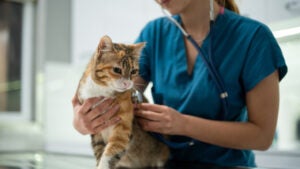Is accident-only or accident and illness pet insurance right for you?



Key takeaways
- Accident-only pet insurance covers unexpected injuries like broken bones or toxic ingestions. Accident and illness insurance provides broader coverage, including chronic diseases and breed-specific conditions.
- Accident-only plans are generally more affordable than accident and illness policies.
- The best policy depends on your pet’s age, breed, lifestyle and health risks, as well as your budget.
- Both types of plans vary by provider and location, affecting premiums and coverage limits. Neither covers pre-existing conditions and typically exclude preventive care.
Pet health insurance provides financial protection for unexpected vet bills, but the range of coverage depends on whether you choose an accident-only or an accident and illness plan. Accident-only plans cover sudden injuries like broken bones or bite wounds. Accident and illness policies offer broader coverage, including conditions like infections, cancer and chronic diseases. The right choice depends on factors like your pet’s age, breed and overall health, as well as your budget and risk tolerance.
In this guide, we’ll break down the key differences, benefits and considerations to help you determine which type of pet insurance best suits your furry friend.
What is accident-only pet insurance?
Accident-only pet insurance covers your pet exclusively for emergencies and accidents. For instance, you might use your coverage when your dog suffers an injury at the dog park or your cat chews the leaves of a poisonous plant. Each pet insurance company has its own definition of “accident.” Read the fine print to understand exactly what accidental injuries entail so you’re not surprised when the bill comes.
For example, ASPCA Pet Insurance considers the following incidents as accidents:
- Bite wounds
- Broken bones
- Cuts and lacerations
- Fractured teeth
- Swallowed objects
- Toxic ingestions
Some accident-only pet insurance plans cover diagnostic services and treatments related to accidents. This may include:
- Blood work
- Hospitalization
- Imaging (MRIs, ultrasounds, X-rays)
- Medications
- Sutures
- Surgery
Generally, these plans are more affordable due to their limited coverage. According to ASPCA sample quotes obtained by Bankrate, accident-only pet insurance for a five-year-old medium mixed-breed male dog in Arizona ranges from $18.23 to $79.80 per month. The cost variation depends on the annual reimbursement limit, reimbursement percentage and annual deductible.
Pros of accident-only pet insurance
- Cost-effective premiums: This coverage typically has lower monthly premiums because it applies to a narrower scope of services than comprehensive plans.
- Straightforward coverage: These policies are simple. They cover only accidents and avoid the complexities of defining and excluding illnesses.
- Peace of mind: Accident insurance ensures you won’t shoulder all costs from your pets’ mishaps.
Cons of accident-only pet insurance
- Coverage caps: Accident-only plans often have financial caps on the reimbursement amount per claim, which may not cover the entire treatment or therapy.
- Limited scope of protection: Accident-only plans do not cover any illnesses, pre-existing conditions, chronic conditions or dental issues.
- Potential coverage disputes: Even though companies provide a list of covered injuries or accidents, there may still be conflicts over what qualifies, leading to denied claims.
- Potential for higher out-of-pocket costs: If your pet develops a life-threatening illness like cancer, chronic conditions like diabetes or age-related issues like arthritis, you are responsible for the full cost of treatment.
What is accident and illness pet insurance?
Accident and illness pet insurance is a more comprehensive protection plan for your dog or cat — but with a higher price tag. Coverage extends beyond accidents to include various chronic and sudden illnesses and emergencies.
For example, accident and illness pet insurance from Embrace includes:
- Bloat
- Broken bones
- Cancer treatment
- Chronic conditions
- Congenital illnesses
- Cuts and lacerations
- Dental trauma (not to be confused with annual teeth cleanings)
- Foreign body ingestion
- Genetic conditions
- General, specialist and emergency care
- Chronic conditions
- Orthopedic conditions
- Physical therapy
- Prescription drugs and medications relating to eligible accidents or illness
Based on example quotes from Embrace, the cost of accident and illness pet insurance for a five-year-old medium mixed-breed male dog in Arizona ranges from $31.69 to $113.18 per month. The price varies according to the annual reimbursement limit, reimbursement percentage and annual deductible you select. With Embrace, you have the option to include exam fee reimbursement for a monthly cost of $4.75 to $16.97 or prescription drug coverage for $5.07 to $18.10 per month.
Pros of accident and illness pet insurance
- Access to more treatment options: Pet owners with comprehensive coverage may be able to consider more extensive or advanced therapies that may otherwise be outside their budget.
- Comprehensive coverage: These plans help to cover the costs of accidents and a wide spectrum of illnesses, ensuring that pet parents can afford pet healthcare for most unforeseen health events.
- Coverage for chronic conditions: This type of policy typically insures chronic conditions that may arise following an accident or illness, provided they didn’t exist before the policy was taken out.
- Financial relief: Though accident and illness plans cost more than accident-only options, they can provide significant savings on unexpected vet bills over time.
Cons of accident and illness pet insurance
- Complex policy terms: Understanding the exclusions, limits and deductibles can be more complicated than with an accident-only policy.
- Exclusions: Many accident and illness insurance plans don’t cover certain elective procedures or pre-existing conditions. Accident and illness policies do not cover preventive care. For that, you may want to consider a pet wellness plan.
- Higher cost: Because these plans cover a multitude of medical conditions, they are more expensive than accident-only insurance.
How do costs compare for accident-only or accident and illness pet insurance plans?
Each plan offers different coverage and pricing. While exact costs vary, the North American Pet Health Insurance Association reports the following average monthly premiums for cats and dogs:
- $56.30 for dogs with accident and illness coverage
- $17.01 for dogs with accident-only coverage
- $31.94 for cats with accident and illness coverage
- $9.68 for cats with accident-only coverage
Understanding the specifics of each policy can help you choose the right option for your pet’s needs and your budget. The following variables can impact your exclusions, restrictions and discounts for pet insurance.
Pre-existing conditions
Whether you choose accident-only or accident and illness pet insurance, very few pet insurance companies cover pre-existing conditions. Some companies, such as Embrace, will cover pre-existing conditions that are curable, symptom-free and treatment-free for a set period.
Animal breed
Both accident-only and accident and illness pet insurance may cost more depending on your dog’s breed. For example, a French bulldog will cost more per month compared to lower-maintenance breeds due to its unique genetic makeup. French bulldogs are susceptible to certain health conditions such as brachycephalic syndrome, hip dysplasia and skin fold dermatitis.
Stage of life
It costs more to insure an older dog or cat, and many companies have age restrictions for new accident and illness pet insurance policies. Older pets may only be eligible for accident-only coverage.
Location
Pet insurance costs vary significantly by location. Cities with higher vet fees and accident risks usually have higher premiums, while rural areas tend to be more affordable. Some regions also have more pet health risks, like Lyme disease in wooded areas, which can impact monthly premiums. State rules and overall living costs also play a role. Pet insurance is typically more expensive in high-cost areas.
When should you choose accident-only coverage?
Remember, accident-only pet insurance only covers accidental injuries as described by the insurance company. Opting for accident-only coverage may be a good option if:
- You have senior pets. Pets older than nine often don’t qualify for accident and illness insurance. However, many pet parents can still get accident-only insurance. This could protect animals with limited visibility or movement, making them more prone to accidents.
- You want to cover major emergencies. This plan is appropriate if you’re primarily concerned about unexpected (and high) vet bills for emergency medical intervention after accidents.
- You’re on a budget. If you have limited financial resources but still want some protection, the lower premiums of accident-only coverage can be an excellent option.
Reddit user review
When should you choose accident and illness coverage?
Accident and illness insurance gives pet parents a little more breathing room when it comes to unexpected vet bills. This comprehensive coverage is likely the better choice if:
- You have room in your budget. If you can afford higher premiums, broader coverage can save you thousands if your pet faces serious health issues or chronic conditions.
- Your pet is aging. As pets age, their risk of illness rises. Comprehensive coverage could be crucial for pet parents managing ongoing treatments and therapies.
- Your pet is at risk for breed-related illnesses. Some breeds are genetically predisposed to certain illnesses. Accident-and-illness policies may provide tailored protection before these conditions arise.
- You want comprehensive coverage. While it may cost more, there is peace of mind in knowing that you’re covered for most types of medical issues and accidents.
- You want more treatment options. Comprehensive pet insurance may be a good choice if you want access to expensive services.
We considered accident-only insurance since our dog has gotten into poison before, but we figured with our luck, we’d be better safe than sorry and got accident and illness insurance.— Lane Gillespie, Bankrate personal finance writer (pictured is his dog Franky)
The bottom line
Both accident-only and accident and illness pet insurance plans provide valuable financial protection against unexpected vet bills. The right choice depends on your pet’s specific needs, along with your budget and risk tolerance. Accident-only insurance offers a more affordable way to cover injuries and emergencies, while accident and illness insurance provides more comprehensive protection. These plans cover a wide range of conditions, from infections to chronic diseases, ensuring broader healthcare access for your furry companion.
With these differences in mind, take the time to compare pet insurance providers, request quotes and review policy details. Consider your pet’s breed, age and medical history, as well as your financial situation, to make an informed decision. Choosing the right coverage can provide peace of mind and financial security to keep your pet healthy.
Why we ask for feedback Your feedback helps us improve our content and services. It takes less than a minute to complete.
Your responses are anonymous and will only be used for improving our website.
You may also like

How does car insurance with telematics work?


Does pet insurance cover pre-existing conditions?

